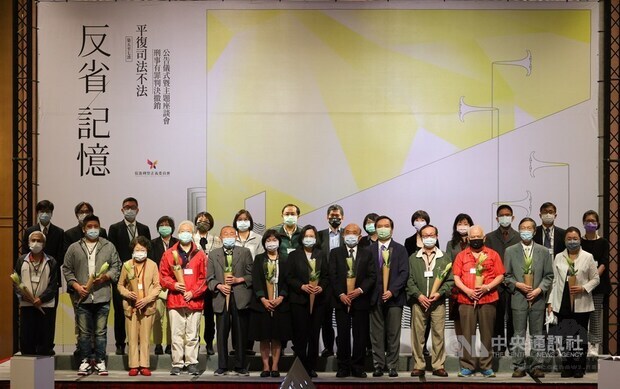
Taipei, March 27 (CNA) The Transitional Justice Commission (TJC) on Saturday announced the latest round of exonerations for 100 individuals found guilty in political trials during the authoritarian era in Taiwan from 1945-1992, involving 105 cases determined to have been unjustly convicted.
The guilty verdicts, including the crimes of rebellion, espionage and subversion, were overturned during a ceremony presided over by President Tsai Ing-wen.
According to data from the TJC, among those exonerated were demonstrating students, reporters and people who armed themselves to defend their homes during the 228 Incident in 1947, as well as political dissidents from the ensuing "White Terror" era.
One of the victims was arrested in 1973 for praising Mao Zedong, then chairman of the Chinese Communist Party; another was apprehended in 1962 for the charge of rebellion and put in jail again in 1980 for saying the Kuomintang government in Taiwan would never be able to return to mainland China, TJC documents showed.
To date, a total of 5,937 persons, involving 5,942 cases, have been exonerated of their "crimes" since October 2018 when the TJC began the process.
During her remarks, Tsai apologized to the victims and their relatives for making them wait so long for justice.
She lauded the TJC for restoring historical truth and rebuilding public trust in the government.
The president then urged the TJC to work for three goals; to speed up the review of political files in government archives, to identify those who violated human rights during the authoritarian period, and to achieve transitional justice through whole-of-government efforts.
"The realization of transitional justice is necessary for Taiwan to deepen its democracy," Tsai said. "Only by facing the truth and healing the wounds collectively, can our society leave grievances behind and move towards a better future."
TJC Chairwoman Yang Tsui lamented that a victim and the relative of a deceased victim, who were both supposed to attend the ceremony, passed away on March 17 and 25, respectively.
She pledged to work double time to push forward transitional justice for surviving victims and their family members, many of whom are advanced in age.